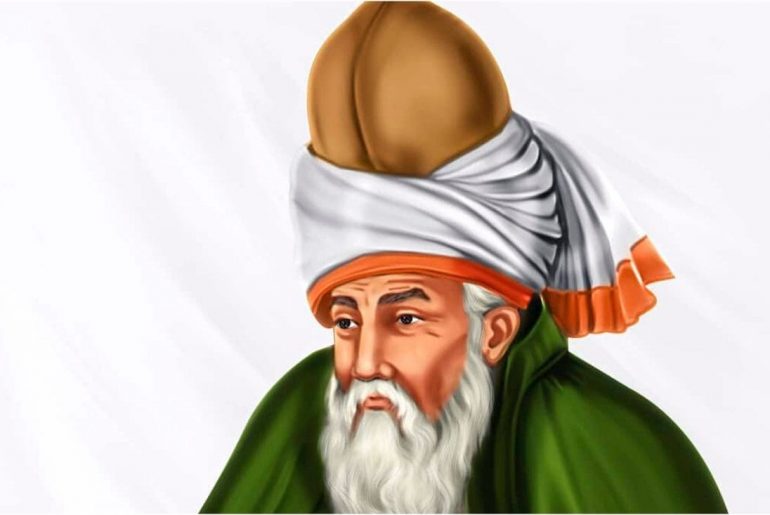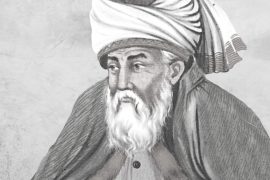Maulana Jalaluddin Rumi was born on September 30, 1207 in Balkh (now Afghanistan) and died on December 17, 1273 in Konya (Turkey). He is considered by many to be “the greatest mystical poet of all time”.
At the age of 12 he and his family had to leave Afghanistan to escape from the Mongols. On the long journey via Baghdad to Meekka and Damascus, Rumi was taught by the best Islamic scholars. His father, also a famous scholar with a strong penchant for Sufi mysticism, was called to a chair at the Seljuk seat of government in Konya. When his father died shortly thereafter, Rumi took over his chair at the age of 22.
Rumi was an extremely popular teacher when his life took a dramatic turn in 1244: the wandering dervish Shams from Tabriz crossed his path and became his spiritual teacher and beloved friend. Konya society was shocked, as wandering dervishes did not have a good reputation. For Rumi, Shams was the face of God personified. For his sake, he dropped everything and neglected his duties as a father, teacher and judge. So it came about that jealous students and Rumi’s relatives put pressure on Shams and drove him out. First Rumi managed to find him again, but one day Shams disappeared forever, probably he was murdered by a son of Rumi.
Rumi suffered terribly at this loss, his soul burned in the fire of his love. From then on he wrote poems for Shams and even began to sign them with his name (this is also the name of his most famous collection of poems Diwan-i-Shamsi Tabrizi). More and more he became Shams, overcoming the great illusion of separation and death. From now on, Rumi’s joy knew no bounds. He had realized the Fanafillah – the un-becoming, the Islamic confession of unity.
if you feel
How your lips become infinite
And sweet as the moon in the sky
when you feel this vastness inside you,
Shams of Tabriz is there too.
He had become a finder of God, and in his joy I twirled, just as Shams had done. Meanwhile, he came up with thousands of poems and stories that ultimately resulted in one of the most important works of world literature (e.g. the so-called Persian Koran: The Mesnevi).
But far beyond his work, Maulana (the master) Rumi is still revered as a saint today. When he died in Konya on December 17, 1273, the celebrations lasted 3 days with music and whirling dance. Members of all religious communities are said to have taken part in the festival. Rumi himself had wished his death to be celebrated like a wedding: “…for at God’s feast no sorrow is appropriate!”
His tomb in Konya is still an internationally visited place of pilgrimage today. His eternal word is written on his grave:
Come, come, whoever you are!
Come, even if you have broken your promises a thousand times!
Come, come, whether you are a Jew, a Christian, or a Muslim. Come!
Rumi and al-Andalus
A very interesting connection exists between the two most important masters of Sufism, between Maulana Rumi and ibn Arabi. These “two oceans of wisdom” met in Damascus, creating a bridge between the free spirit of al-Andalus and the path of universal love of Rumi.
The Rumi researcher and Sufi master Dr. Seyed Mostafa Azmayesh tells of this connection in Rumi’s life: “After the death of Rumi’s father, the Sufi master Tarmazi Borhan took over his education and spiritual training. He soon made it clear to Rumi that although he was the heir to his father’s physical possessions, he was far from mature enough to become his father’s spiritual successor. He convinced him that mastery is not to be attained through inheritance, but is formed through one’s own disciplined and orderly work and many tests of inner maturity. Rumi accepted Borhan’s advice to first go to school in Damascus with Ibn Arabi for seven years. He left his family in Konya and immersed himself in the methods and teachings of Ibn Arabi, who had previously learned, taught and worked in Andalusia.
After seven years, Rumi came back from Damascus and Borhan now accepted him as his disciple. Rumi was 38 years old then. Borhan died and Rumi was now ready to take over. Ultimately, three streams of oriental mysticism met in Rumi and formed a new method. From the north-east the Khorasan style with points of contact from shamanism, Hinduism and Buddhism. From the west, the Andalusian style with references to Christianity. Lastly, Rumi’s spiritual master Shams brought the Azerian style from northwestern Persia, from Azerbaijan, where the cradle of Zoroastrians and the Mithraic cult was found, where the magicians had their headquarters.
Through Rumi, Sufism achieved a balance between detachment through solitary meditation and semah, which means musical gathering to celebrate the spiritual side of life. The music got a very high status in mysticism through Rumi. Important Sufi masters were also music researchers. This has to do with the effect of music on the human soul in general and the vibrations behind the rhythms in particular. Since time immemorial, these rhythms have been used at different levels as a means of developing the deep human substance. Rumi can be considered the founder of a new Sufi style in which music (and poetry IE) is used in a very elaborate and subtle way as a spiritual training tool.
Rumi’s legacy for humanity is precisely this: to break the narrow limits of a supposed superiority of a single religion or belief or its fundamentalist restrictions. He was a bridge between individual cultures… Through Rumi, the theoretical aspect of Sufism as a social impulse to open up to foreign worlds was put into practice.”
Rumi about life
Tie two birds together; they will not be able to fly, although they now have four wings.
Gratitude is wine for the soul, come get drunk!
A wound is a place through which the light enters you.
It is your path – some can walk it with you, but no one can walk it for you.
Go and find yourself – that’s how you can find me too.
Yesterday I was smart and wanted to change the world. Today I am wise and I want to change.
There is a voice that uses no words – listen to it.
Forget security. Live where you fear to live. Destroy your reputation. be notorious
Your task is not to seek love, but only to seek and find all the obstacles within you that you have built up against it.
Show yourself as you are or be as you show yourself.





